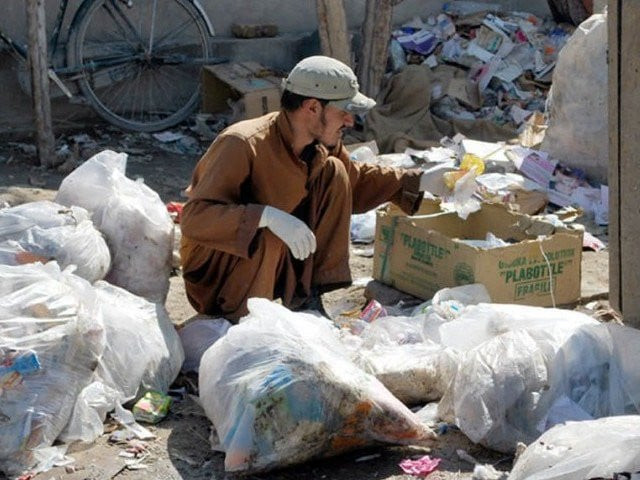Unsafe waste disposal practices continue to plague Ratodero
Incinerator installed in wake of HIV epidemic remains non-functional, streets serve as garbage dumps

Two years and a pandemic later, the crisis that put Ratodero, a remote, sleepy town located 30 kilometres north of Larkana, on the world’s map appears to have fallen off the Sindh health authorities’ priority list.
The lax medical waste disposal practices that resulted in a terrifying health crisis - a Human Immunodeficiency Virus (HIV) outbreak among children in 2019 - appear to continue unabated.
An incinerator that was installed in its wake remains non-functional till date. The HIV epidemic, which came to the fore in April 2019, had shocked the world. Most couldn’t fathom how children as young as a few months old could be infected by a virus that is commonly associated with sexual transmission.
And yet, according to the World Health Organisation’s website, from April 25, 2019 to June 28, 2019, 30,192 people were screened for HIV and 876 of them were found positive. The website states that 719 of them - 82 per cent - were under 15 years of age.
The numbers could not be ignored. The HIV-infected children could not be ignored. Their parents demanded answers, as did the media, as did citizens and as did the world. And as the government and health authorities scrambled to find answers it was clear that heads had to roll.
Read What is the future of Karachi?
There had to be something to explain the outbreak among children. The first to take the hit was Dr Muzaffar Ghangro, a doctor believed to have infected 900 children by reusing infected syringes.
Then, as local and international media descended upon the small town it emerged that Ratodero’s streets were not just littered with quack - fake - doctors but also used syringes and medical waste.
Two years on little has changed.
Lax measures
Doctors in Ratodero claim that medical waste is now dumped at the incinerator installed by the government at the taluka hospital.
However, despite the tall claims of the provincial health department in the days following the outbreak, the incinerator remains non-functional. “We have reminded the authorities to make it functional,” said Pakistan Medical Association (PMA) Ratodero General Secretary Dr Imran Akbar Arbani.
But, he added, the PMA’s requests have fallen on deaf ears. The local administration does not take hospital waste seriously, alleged Dr Arbani, a private practitioner who alerted the health authorities to the outbreak by correctly diagnosing scores of HIV and acquired immunodeficiency syndrome (AIDS) - the disease the virus leads to if left untreated - positive children in 2019.
“Medical waste is more hazardous than domestic waste. It has already infected so many people,” he reminded.
Some local doctors do dispose of the gar- bage from their clinics at the taluka hos- pital, where the incinerator was fixed, he tells The Express Tribune . The waste is then burned there, he adds.
Multiple attempts were made to contact the provincial head of the HIV/AIDS Control Programme Dr Saqib Shaikh for his comment on the current medical waste disposal mechanism in Ratodero but he could not be reached.
A sore sight
The hub of the epidemic in 2019 was the Nano Mal Mohalla. It is where a majority of Ratodero’s private clinics are located. Less than half a kilometre away, is Fatehpur neighbourhood, where hundreds of used syringes, sharp needles, cannulas, discarded blood bags and empty medicine containers can be found dotting an empty plot.
Young children from the neighbourhood frequently visit the plot to play. Their peals of laughter are routinely interrupted by the crunch of syringes being crushed under their feet. The litter, on occasion, features into their play. But the children fear neither the needle’s prick nor its devastating consequences.
They prance about in the vacant plot, some of them barefoot, for the garbage is not an unfamiliar site. “These clinics regularly dump their waste here,” said a local resident, speaking to The Express Tribune. . He points to a small maternity home nearby.
Read more Karachi toils with water crisis amid lockdown
“They dump their waste [here] and then burn it daily.” The man adds that the residents too dump their garbage in the same plot. “The municipality occasionally takes it [the trash] away,” he said.
‘Not here though’
Two years ago, in Nano Mal Mohalla, heaps of medical waste and other garbage were found piled up in an empty plot situated smack in the middle of around a dozen private clinics. News reports had spurred the authorities into action and it was then that the installation of an incinerator had been announced.
While the incinerator remains non-functional, 10-feet-high walls have been built around the empty plot.
“We were under pressure from the government to construct the walls,” said the owner of the plot, speaking on the condition of anonymity. “No one is throwing any garbage here now.”
The doctors from nearby clinics also claimed that medical waste was no longer being thrown around in any open space in the city. “I do not throw waste in the city but at the facility located in the taluka hospital,” said Dr Naresh, who runs a private clinic situated in the area.
“There were some doctors throwing their garbage in the plot some time ago,” he concedes before hastily adding that he wasn’t one of them. Another practitioner, Dr Akhtiar also said that the waste from his clinic is sent to the incinerator. “Used syringes and cannulas, particularly, are disposed of carefully,” he claimed.
And yet, the garbage dump a short distance away, and used syringes, blood bags and cannulas dotting Ratodero’s streets tell another tale


















COMMENTS
Comments are moderated and generally will be posted if they are on-topic and not abusive.
For more information, please see our Comments FAQ